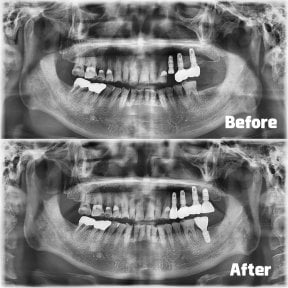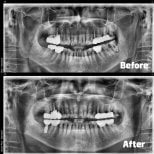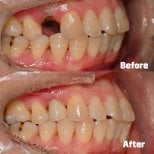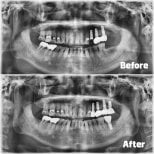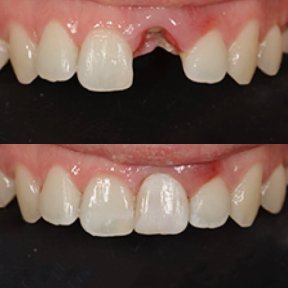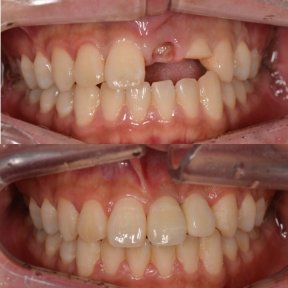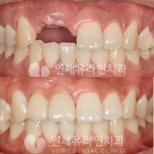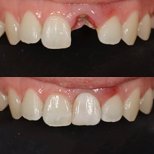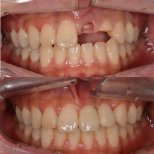El Dr. Ji Ho Ahn, prostodoncista con 19 años de experiencia y más de 900 procedimientos realizados, se especializa en implantes dentales con el sistema Straumann®. Los implantes individuales cuestan alrededor de 700 $, lo que suele incluir la consulta, la planificación radiográfica y la colocación del implante Osstem BA, sin necesidad de pernoctación. Para la restauración de arco completo, los implantes All-on-4 cuestan aproximadamente 8.820 $, incluyendo 7 días de atención hospitalaria. La clínica atiende a 5.000 pacientes al año de seis continentes y requiere planes de tratamiento personalizados basados en radiografías preliminares.
¿Qué son los implantes dentales coreanos?
Losimplantes dentales son raíces artificiales que se colocan en la mandíbula para sustituir los dientes perdidos. Encima se añade una corona o un puente para restaurar la función masticatoria y la apariencia.
En Corea del Sur, los implantes dentales son:
- Fabricados con titanio o circonio biocompatibles, que se fusionan de forma segura con el hueso y reducen el riesgo de rechazo o inflamación.
- Producidos por los mejores fabricantes mundiales, como Osstem y Dentium.
- Se colocan con tecnología digital avanzada, como la cirugía guiada en 3D.
Y lo que es más importante, los implantes coreanos están hechos para durar: los estudios demuestran que alrededor del 97% siguen siendo totalmente funcionales 10 años después.
¿Quién es el mejor candidato para un tratamiento con implantes dentales?
El candidato ideal para la cirugía de implantes dentales es alguien que:
✔ Le faltan uno o más dientes.
✔ Tiene suficiente hueso maxilar para soportar un implante (o es elegible para un injerto óseo o elevación de seno).
✔ Mantiene una buena higiene bucal y encías sanas.
✔ Goza de buena salud, sin enfermedades no controladas como diabetes grave o cáncer activo.
✔ No fuma o está dispuesto a dejar de fumar durante la cicatrización.
Por qué ponerse implantes dentales en Corea?
1. Costes asequibles de los implantes dentales
El coste de los implantes dentales en Corea ronda los 1.000-2.000 dólares, frente a los 2.000-6.000 dólares de los países occidentales. Incluso con los gastos de viaje, los costes totales suelen ser entre un 50% y un 70% más bajos.
2. Experiencia mundial en implantes dentales
Corea del Sur es el segundo mayor exportador de implantes dentales del mundo. Es la cuna de Dentium, Megagen y Osstem, sistemas de implantes utilizados en más de 70 países.
3. Uno de los mejores sistemas dentales del mundo
Según un estudio publicado en el Journal of Dental Health, Oral Disorders & Therapy, Corea del Sur tiene el segundo mejor sistema de atención dental del mundo. Es más eficaz que en Estados Unidos, Reino Unido, Canadá o Australia.
4. Tecnología avanzada
Las clínicas dentales coreanas utilizan habitualmente escáneres 3D CBCT, impresiones digitales y colocación de implantes guiada por ordenador. Estas herramientas hacen que el tratamiento sea más seguro, rápido y preciso.
5. Dentistas experimentados y cualificados
Cada año, los dentistas de Corea del Sur realizan más de 1,8 millones de implantes dentales. Los implantólogos que trabajan con Bookimed han recibido formación internacional en instituciones como la Universidad Johns Hopkins y enseñan en las mejores facultades coreanas, como la Facultad de Odontología de la Universidad Yonsei, una de las instituciones odontológicas más prestigiosas de Asia.
6. Tiempos de espera cortos
A diferencia de Estados Unidos, Australia o Reino Unido, donde los pacientes suelen esperar hasta 18 semanas, las clínicas dentales coreanas pueden programar la cirugía de implantes en cuestión de días.
7. Experiencia fluida para pacientes internacionales
Las clínicas están bien preparadas para el turismo dental. Ofrecen personal que habla inglés, planes de tratamiento claros y ayuda logística con los traslados al aeropuerto y el alojamiento. El proceso es rápido, eficaz y está diseñado para ajustarse a un viaje corto.
¿Qué tipos de implantes dentales existen en Corea?
1. Implantes endodónticos
Es el tipo de implante más tradicional. Se colocan directamente en el hueso maxilar y son ideales para pacientes con un volumen óseo sano.
2. Implantes subperiósticos
Se utilizan cuando el hueso maxilar no es lo suficientemente fuerte y el paciente no puede someterse a un injerto óseo. Se colocan encima del hueso, debajo de la encía.
3. Implantes cigomáticos
En casos de pérdida ósea grave en el maxilar superior, los implantes cigomáticos se anclan en el pómulo (cigoma) en lugar de en el hueso maxilar.
4. Implantes dentales de boca completa (All-on-4 / All-on-6)
Para los pacientes que han perdido la mayoría o la totalidad de sus dientes naturales, las clínicas coreanas ofrecen restauraciones de arcada completa. Consisten en colocar 4 ó 6 implantes para soportar una arcada fija de dientes protésicos. Es una alternativa estable y a largo plazo a las prótesis removibles.
5. Miniimplantes
Son de menor diámetro (menos de 3 mm) y a menudo pueden colocarse en una sola visita sin cortar la encía. Los miniimplantes son ideales para estabilizar prótesis dentales en pacientes con hueso limitado. Sin embargo, son menos duraderos y no se recomiendan para sustituir molares o arcadas completas.
¿Cuáles son las mejores clínicas de implantes dentales de Corea del Sur?
Según la clasificación de Bookimed, estas son las mejores clínicas coreanas de implantes dentales en función de las certificaciones, la formación de los médicos, la satisfacción de los pacientes y el uso de tecnología avanzada:
| Clínica | Ubicación | Qué destaca | Coste estimado |
| Clínica Dental Yonsei Uline | Seúl | La Clínica Dental Yonsei Uline está certificada por KOIHA. Los médicos han estudiado en Yonsei, NYU y la Universidad del Pacífico. | ~13.200 $ por implantes dentales en toda la boca |
| Hospital Dental S-Plant | Seúl (Gangnam) | Graduados por la Universidad Nacional de Seúl, 3D-CT, laboratorio propio, aromaterapia y programas de recuperación sin estrés. | ~1.800 $ por un implante coreano |
| Clínica Dental DIER | Daejeon | Anestesia local con anestesista. Más de 15.000 pacientes tratados en 18 años. | ~10.000 $ por implantes dentales en toda la boca |
| Clínica Dental Seoul Today | Goyang (cerca de Seúl) | Médicos formados en EE.UU. y SNU. Más de 16.000 pacientes al año. A 30-40 minutos del aeropuerto internacional de Incheon. | 1.500-1.800 $ individual / 9.000-10.500 $ arco completo. |
| Gangnam Gentle Dental | Seúl (Gangnam) | Enfoque estético y tecnología 3D. Dirigido por el Dr. Sungho Kim, juez en el concurso Miss Corea Global. | Entre 1.000 y 2.000 dólares por implante coreano. |
¿Cómo funciona el procedimiento de implante dental en Corea?
El tratamiento con implantes dentales suele durar dos visitas a lo largo de 3-6 meses, con un periodo de cicatrización intermedio.
➡️ Visita 1 (2-3 días)
Tras una consulta inicial y un escaneado 3D, el dentista coloca un implante en el hueso maxilar. Si es necesario, en esta fase los especialistas realizan injertos óseos o elevaciones de seno.
➡️ Periodo de cicatrización (3-6 meses)
El implante se une al hueso en un proceso denominado osteointegración. Llevar una prótesis provisional o una corona durante esta fase ayuda a los pacientes a comer y hablar cómodamente mientras esperan los dientes definitivos.
➡️ Visita 2 (3-5 días)
Se fija el pilar (un conector) al implante, seguido de la corona o un puente fijo. Se ajustan el ajuste y la mordida antes de finalizar el tratamiento dental.
¿Cómo es la recuperación y el postratamiento?
Los pacientes se recuperan rápidamente tras la cirugía de implantes coreana. Los primeros 2-5 días suelen presentar hinchazón, hematomas o molestias leves, que se tratan con analgésicos y una dieta blanda.
Es esencial una buena higiene bucal:
- cepíllese suavemente los dientes con un cepillo de cerdas suaves;
- utilizar enjuague bucal antibacteriano si se prescribe;
- acudir a las revisiones de seguimiento.
Las visitas y limpiezas dentales periódicas previenen complicaciones como el fracaso del implante o la inflamación de las encías.
¿Cómo puedo elegir la mejor clínica y el mejor dentista de Corea?
- Compruebe las credenciales. Busque clínicas certificadas por KOIHA y dentistas formados en las mejores universidades, como Yonsei o la Universidad Nacional de Seúl.
- Pregunte por la experiencia. Elija dentistas que realicen implantes con regularidad. Pregunte cuántas intervenciones realizan al año.
- Busque tecnología moderna. Una buena clínica debe utilizar escáneres 3D CBCT, impresiones digitales y colocación guiada de implantes.
- Compruebe las marcas de los implantes. Pregunte si utilizan los mejores implantes dentales coreanos, como Osstem y Dentium, u opciones internacionales como Straumann.
- Compruebe las opiniones y fotos de pacientes. Busque casos reales de antes y después y opiniones de pacientes internacionales.
- Confirme el apoyo al turismo médico. Asegúrese de que la clínica ofrece personal médico que habla inglés y planes de tratamiento dental claros si viene del extranjero.
¿Qué debo esperar si viajo a Corea para operarme de implantes dentales?
| Categoría | Detalles |
| Visado | La mayoría de los turistas occidentales entran sin visado durante 90 días. |
| Vuelo | Desde EE.UU.: 600-800 $ ida y vuelta, ~13-14 horas. Desde Europa: 500-600 euros, ~11-12 horas. |
| Alojamiento | Económico: 50-100 $/noche. Medio: 100-200 $/noche. |
| Gastos diarios | Comidas: ~40 $/día. Transporte público: ~$4-10/día. |
| Formas de pago | Las clínicas dentales aceptan KRW, Visa/Mastercard, transferencias bancarias y cheques. Pueden aplicarse gastos de tramitación (1-4%). |
| Seguridad | Corea del Sur figura entre los 20 países más seguros del mundo. Marca el 119 para emergencias. |
💚 La mayoría de las clínicas dentales ofrecen tarifas con descuento para hoteles cercanos y traslados al aeropuerto por un cargo adicional.
Qué alternativas hay a los implantes dentales?
Si, basándose en un examen dental, los implantes no son adecuados, los pacientes pueden considerar las siguientes opciones:
- Puentes d entales - utilizar los dientes adyacentes para apoyar uno o más dientes falsos);
- Dentaduras postizas removibles - sustituyen a varios o a todos los dientes que faltan y pueden extraerse para su limpieza.
Recursos
- Cirugía Plástica y Reparadora Maxilofacial. (2023). Tasa de supervivencia a 10 años de implantes cónicos autorroscantes a nivel óseo de pacientes coreanos médicamente comprometidos en una unidad de cirugía maxilofacial.
- Clínica Mayo. (2024). Cirugía de implantes dentales.
- The Korea Times. (2024). Exports of dental implants hit all-time high: data.
- Journal of Dental Health, Oral Disorders & Therapy. (2024). Comparación del estado de salud bucodental y los costes de la prestación de atención odontológica en diez países de renta alta.



